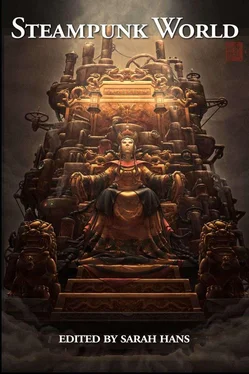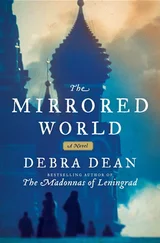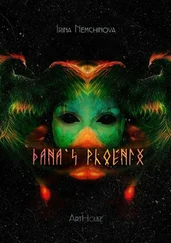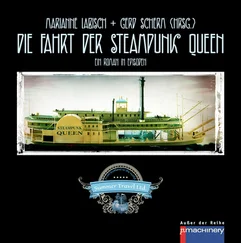They’d chased his father from his truth once, and Tariq had done so again with his own heart. He would not let them triumph a third time. He ran for the lever, ran against the bullets that sang out for him. He lunged, dragging the lever down with the weight of his body, the hot blade of a round flashing across his back. Another bedu joined him, adding his weight to the teacher’s. The gear rumbled and spun, almost cutting into his shoulder as it tore his shirt. The heavy door slammed shut, drowning out all but silence.
They all stared quietly at the Garden of Manāt below them. The bedu marveled and muttered soft prayers, some already descending to explore the cavern. There were trees and vegetation lit by the strange blue light that had powered this city; and beyond it? Tariq didn’t know but the sleeping giants could not have come up by these stairs. There was more to discover deeper inside. Perhaps, even a way out.
A bandage covered Raakin’s arm, and one of the women tended to the graze across Tariq’s back. Tariq added the missing pages back to the tome and wondered what tales they would tell now.
How this place would have troubled the Muslims for its blatant iconography and delighted his father for its history. He could see the man now, his eyes narrowed in a smile, his voice delighted as he murmured:
Kan, ma kan.
There was, there was not.
Tariq finally understood why now—that what his father had sacrificed in the moment was nothing compared to what he was protecting. He’d left Damascus with the shirt on his back and his son’s hand in his. What more did he need? Tariq understood, now, that not having everything was not the same as having nothing.
Tariq smiled. “There is, father,” he said, and joined the others as they descended into the chamber.

Hatavat Chalom
Lillian Cohen-Moore
It is as always, the same.
The gates of the city rang beneath the siege forces, summoning sonorous booms that rivaled any thunder to be found in nature. Bombards and culverins filled the sky with sparks and smoke. Their wheels turned beneath them, large and unforgiving. The condottieri on the battle field followed the shouted orders of their Capitans, bound not by loyalty to the city state, but to the pay to come. The gendarmes were deep within the fighting; cutting men from their horses with bewildering speed, taking men from the battle as if they were of one mind, a many-headed malakh ha-mavet, the Angel of Death come to the battlefield of mortal men. For every gendarme taken from his horse, another took his place. The ground was carpeted in bodies, man and horse alike.
A once smoke-stained blue sky above them soon grew darker still. As if an eclipse was forming in the heavens above them, darkness began to fall over the battle. A single swath of long black shadow, married to a rumbling that shook the ground, a sound threatening to eclipse the clash of armies. It was not painted in the livery of a city-state, or that of a foreign King. It rose up from among them, its body metal, dark, the great grinding of wheels and gears serving as its own cracking vertebrae and clicking teeth. It steamed and moved, its gait steady. Its first step drew no great notice, but the second shook the ground.
It was a beast. A monster of gargantuan proportions, taller than a ballista, a mockery of the men around it, be they French or Italian. For it was not a man, but a wide expanse of metal unlike any they had ever seen. Its encroaching wheels came down upon a few unlucky fighters, and if they screamed louder than those dying around them, there was no way of sorting the sounds of their ignominious death from the slaughter at hand. It stopped moving, as mercenaries and loyal armies looked upon its visage, its black and copper body. For a breath, the world pulled upon itself, unsure of the thing that had entered it. The fighting slowed, ceasing in its shadow. And as the trembling fighters began to move away, its chest opened, a black void from which hellish smoke billowed, and from within it came a great wailing sound. Twin vibrations shook along the air, fire and forge laboring together.
The dream was always the same, the too-sharp smell of battle and fear, the intake of breath as they gazed upon the dark hole and the depths within it. From inside it came the flash of muzzles, and unholy sound of dozens of culverins, firing as one from inside its dark form. It was still the last thing she saw before her eyes opened to see the ceiling above her bed.
As she had for many mornings, Margarita Contanto woke screaming, the sound being torn from her body one of mindless, primal fear. Her Aunt Caterina was the one person in their home brave enough to try comforting her, to hold the thrashing younger woman firmly in her arms, ignoring the smears of tears soaking into the front of her dress, or the screams that caused her ears to ring.
Caterina would rise before the sun to take on matters of the household, but it was Margarita who would wake as the sunrise crept over the ghetto for the past month, waking the household along with her through the sound of her tortured screams.
Margarita joined her Aunt in her morning labors after she prepared herself to greet the day, returning the books hidden in her bedside to her absent Uncle’s study. Math and science were for the hours no one was awake. Her morning would be one of labor with her family. Margarita’s cousins, Lorenza and Fiora, were part of the complicated morning dance of cooking, sewing and correspondence. When Margarita reached for another piece of mending, her hand closed around an envelope instead. Startled, she raised her head to see her aunt.
“You have done more than enough work for the morning.” Caterina reached out to touch her on the cheek, a gesture that summoned vague recollections of her own mother. “You must take this message into Ghetto Vecchio. There is a household there that awaits it.” Caterina curved her fingers, pulling a few of Margarita’s unruly curls behind one of the young woman’s ear. “You will bear the letter for me, to Isaac de Fonseca’s household. Give the letter to his sister, Veronica. Tell her your Uncle will come to them in a few weeks, when both he and Isaac have each returned from their journeys.” Caterina waited for her niece’s hand to withdraw the letter from the basket, and press it gently against her chest.
“I shall go now?”
Caterina went to reach her hand out again to touch her niece, but instead let it fall, her expression inscrutable. “Yes. Go now. I will see you when you have returned.”
Margarita dwelled on the conversation as she went to prepare herself to leave for the Ghetto Vecchio, full of Levantine Jews from the Ottoman Empire. She repeated the directions back to Caterina three times before her Aunt would let her step out the door. Carrying the message against herself, arms folded over her chest, she made haste to cross the island of the Ghetto Nuovo. Between the two ghettos was a simple bridge over a canal, and it was that slender ribbon of connection she would use to cross into the other ghetto. The rain falling on the stones beneath her feet was not yet a downpour, content to fall upon her as a mist, with few droplets rising back up from the ground, inundating her with the smell of moist cloth and stone. For a moment, the earthen smell of wet stone tugged at her memory, the smell of the battered city walls beneath the siege engines. Had it been raining in her nightmare?
She shook her head as she went over the bridge, quickening her pace. It was a dream. A strange, frightening dream, and one day it would go away and she would be as she was before it came—without a single recollection of a dream. Her passage into the Vecchio streets was unremarkable. The smells of bread, pastry, wet stones and hot air were the same in either ghetto, though the scent of metal was still curiously stronger off the island and on the streets of Ghetto Vecchio. Even with the rain, the sunshine still struggled through the clouds above her. It would be hours till sunset, and she would surely return to Ghetto Nuovo by then, ready to be locked inside with the rest of her people, as she had every night for as long as she had lived. Only from dawn to dusk were they even remotely free.
Читать дальше













